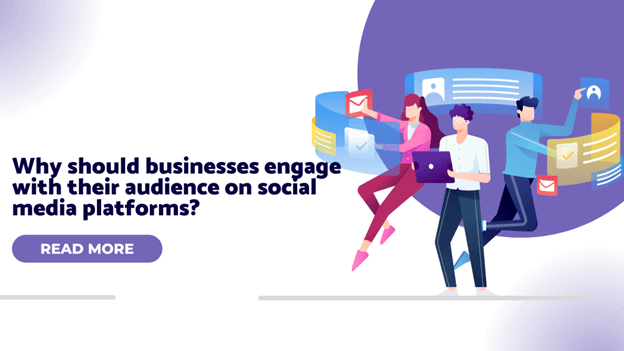Social media has become an inseparable piece of our daily activity. Don’t you agree? You might be surprised to know that billions of people actively use platforms such as Facebook, Instagram, Twitter, and LinkedIn daily. This fact brings us to a realization that in today’s digital time, businesses cannot afford to ignore the power of social media. It has also been observed online businesses that engage with their customers on social media channels, or platforms are more likely to convert.
In this article you shall explore the reasons why businesses online should engage with their customers.
-
Establishing meaningful connections with customers:
Contents
Social media allows businesses to communicate directly with customers instantaneously. You can respond promptly to customer queries and concerns which in turn business help build trust and loyalty.
For Example, Zappos, an online shoe retailer, excels in customer engagement on Twitter. Their personalized responses to customer inquiries have established them as a reliable and customer-centric brand.
2. Constructing brand recognition and visibility:
Social media strategy helps businesses to connect with large and untapped audiences. This reach then can be used to actively engage with their audience to increase brand recognition and recall. You might know that ecommerce websites such as Amazon invest heavily in ecommerce seo services and social media platforms to drive success.
For Example, Amazon’s interactive campaigns on Instagram and Twitter have significantly boosted their brand visibility, creating a strong presence in the minds of their audience.
-
Leveraging user-generated content:
Businesses can encourage their users to share their experiences and opinions on social media, which can spread positive word-of-mouth marketing. This initiative can lead to customers creating user generated content which further acts as a catalyst for new customers to buy the product and services.
For Example, GoPro, a leading action camera brand, has successfully utilized user-generated content on platforms like YouTube and Instagram. By showcasing videos by their customers, they have created a strong community of loyal fans and stimulate brand advocacy.
-
Gathering valuable customer insights:
Social media platforms also serve businesses with a huge chunk of data and awareness. By monitoring conversations, feedback, and conducting polls/surveys, businesses can understand customer preferences and improve their products/services.
For Example, Starbucks effectively utilizes social media listening tools to gather customer feedback and tailor their offerings to meet consumer demands.
-
Increasing website traffic and conversions:
Engaging with your visitors on Instagram or Facebook can bring traffic to websites online. By sharing engaging content, businesses can increase click-through rates and conversions.
For Example, Blendtec, a blender manufacturer, gained significant attention and increased sales through their “Will It Blend?” YouTube series. The entertaining videos showcased the blender’s capabilities, leading viewers to visit their website and make purchases.
-
Expanding customer reach and targeting:
Social media advertising features allow businesses to focus on specific demography and interests. This helps you to promote your products to the audience that you think is fit for your product or services.
For Example, Airbnb has effectively utilized Facebook’s targeting options to reach travelers interested in unique accommodations. By customizing their ads based on location, interests, and travel preferences, Airbnb successfully expanded its customer reach and boosted bookings.
Engaging with the audience on social media enables businesses to establish expertise and thought leadership. This is supported by the fact that when you start solving the common problem or queries of your users around the product, you develop a sense of trust. This sense of trust will then guide the current and new customers to hold your brand.
For Example, HubSpot, a marketing software provider, regularly shares industry insights and valuable content on platforms like LinkedIn and Twitter. Their thought-provoking posts have positioned them as a trusted source of information, enhancing their brand credibility.
-
Keeping up with competitors:
By analyzing competitors’ social media strategies, businesses can identify gaps and opportunities for improvement. You never know; the strategies that worked for your competitors may as well work for you.
For Example, McDonald’s, for example, observed the success of Wendy’s sassy and engaging Twitter interactions and adapted their own approach. This shift in strategy allowed McDonald’s to stay relevant and competitive in the market.
Final Words!!
Engaging with the audience on social media platforms is no longer optional for businesses; it is essential for success in today’s digital landscape. By building brand awareness, establishing meaningful connections, leveraging user-generated content, gathering valuable insights, increasing website traffic, expanding customer reach, enhancing brand credibility, and keeping up with competitors, businesses can unlock numerous benefits. By opting for social media engagement, businesses online can weave a deeper connection with their audience. This is not it; by doing so, you can make your customer a loyal advocate of your brand, which provides long term growth for your company. Now if you don’t possess a social media platform for your business, create now to taste success.

